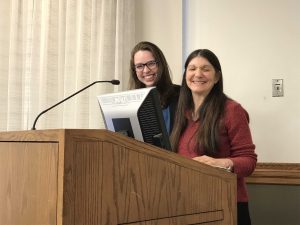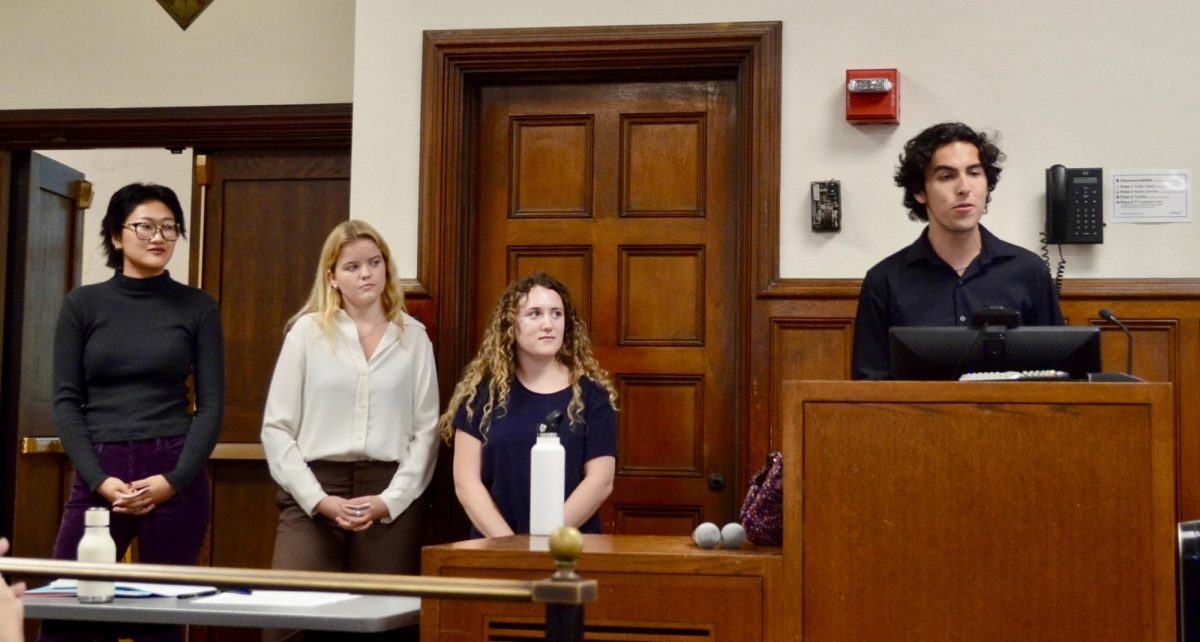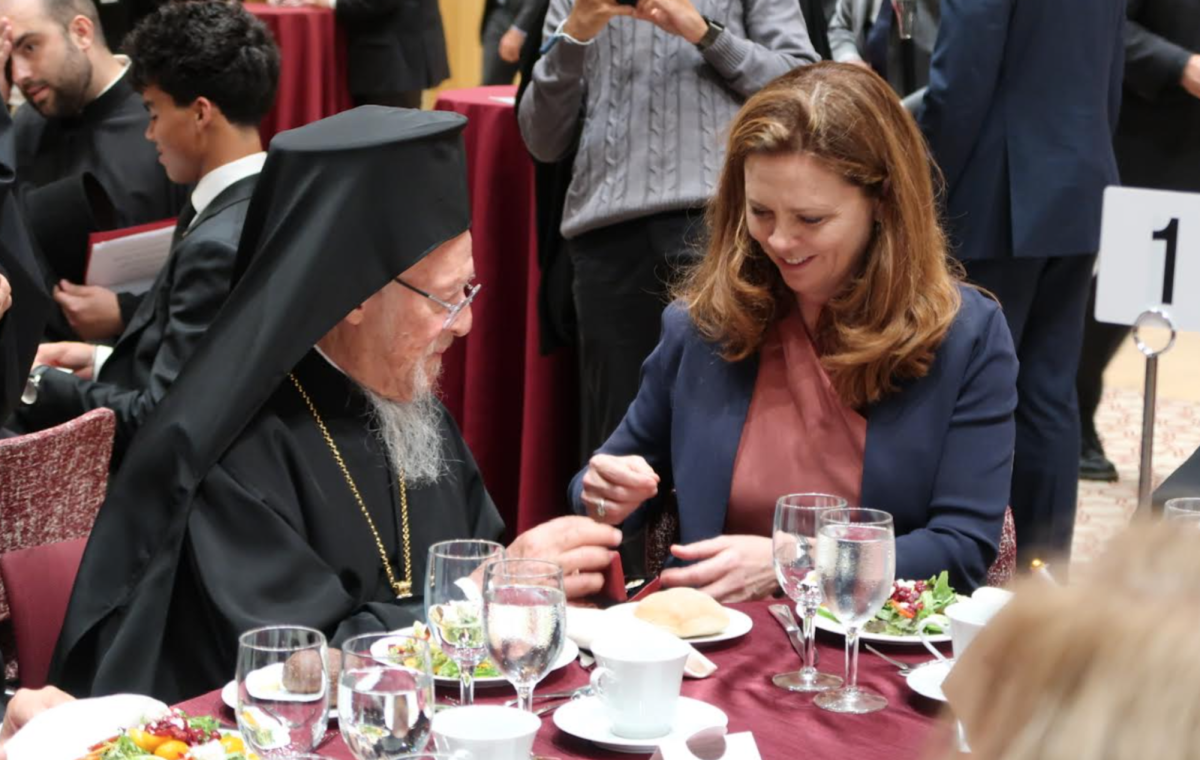By Joe Esposito
With 27 years of experience, Loretta Tofani, FCRH ’75, spoke to Fordham students on Monday evening about her path in the field of journalism. Tofani addressed her love of journalism as well as the scope of her career, from formative times as the first female editor-in-chief of The Fordham Ram, to her Pulitzer prize winning reporting at The Washington Post.
Tofani said she wanted to be a journalist since she was a child, as it seemed like a way to see the scope of the world.
“To me, journalism was a way to see the world, to see events, to interpret the world on my own, to really be out there,” she said.
She began her life as a journalist as an editor on her high school paper and continued on that path at Fordham. Turning down a full scholarship from another school, she said she chose Fordham because of its communications program and reputable campus newspaper. She said the Jesuit tradition was also important to her.
“I really admired the Jesuits,” she said. “I knew that there was rigor in their teaching and in their thinking.”
When Tofani came to Fordham, she immediately joined The Ram and wrote articles and took on different jobs there. She was a reporter, then an editor and finally the editor in-chief, the first woman to ever hold that position. She said her time at The Ram honed her journalistic skills.
“During all the countless hours of interviewing, writing, planning Ram issues with my colleagues and spending all-nighters at the printers, I practiced the skills and dedication involved in a career in journalism,” she said.
Tofani spent her summers doing reporting through various internships and jobs. These experiences helped her decide that reporting and being out in the world was what she wanted to do.
After Fordham, she attended the University of California, Berkeley, where she got her Masters degree in journalism.
After that, she worked as an intern at The Washington Post, where she spent her summer filling in for reporters on the national staff covering hearings in Congress. This eventually led to her full-time job at The Post, where she worked for nine years. It was there that she covered many areas of the news, one such being courthouse proceedings. It was during her time on the courthouse beat that she found inspiration for her series, which won a Pulitzer Prize.
Working in the court house brought to her attention a problem in the prison system. Many men who were in jail, awaiting trial and unable to pay bond, were sexually assaulted in county jails. Most of these men had not been convicted of any crime, and most were later acquitted. Talking to many judges about this, Tofani was surprised to learn that this was a common problem.
“I was struck by the fact that this was being accepted as so normal,” she said.
After some hesitation by editors on The Washington Post to pursue the story herself, she finally found the opportunity to do so. In nine months of work, she gathered information. She documented the sexual assaults, speaking to victims as well as perpetrators. She obtained medical records. Through her interviewing, she compiled all the details she needed to put together a series made up of 24 case studies which went on to win the Pulitzer Prize.
“As a result of the series, the jail cleaned up its act,” said Tofani.
The story also resulted in prison reform: prisons hired more guards, made cells more visible and separated violent offenders from potential innocent inmates, according to Tofani.
However, after the Pulitzer, Tofani said she still had a desire to be a foreign correspondent as opposed to an investigative reporter.
“I became known as an investigative reporter, but really in my heart I wanted to do something else,” she said.
She was able to make these dreams a reality when she accepted an offer from The Philadelphia Inquirer to become the Beijing bureau chief. It was through this position that she traveled throughout Asia covering various stories.
“This was the highlight of my career,” she said.
Tofani said the transition to being a journalist in China was challenging since limits are placed on foreign journalists working there.
She recounted times in which Chinese authorities gave her trouble for not conducting interviews through the designated governmental office.
“China made me appreciate the freedom we journalists have in America,” she said.
She returned to China often after leaving The Inquirer in 2001, creating another award-winning series called “American Imports, Chinese Deaths.” This documented the fatal occupational diseases and limb amputations that the Chinese suffered making products for Americans.
“Throughout my best work, I’ve been able to raise implicit moral and ethical questions,” she said.
Tofani said her time at Fordham helped her raise these moral questions.
“My time at Fordham helped me be able to frame these questions and help me in some way actually be able to see these as stories,” she said.
Tofani offered her career advice to other Fordham students interested in the field of journalism, saying that getting initial experience at a publication is crucial.
“If you can get an internship, or better yet, a real job, take it,” she said.
Tofani said her time at The Ram was important to her, so she wanted to come back for its centennial speaker series.
“It was a very big part of my life being a part of The Ram, and I wanted to come back to Fordham to celebrate The Ram’s 100th anniversary,” she said.
Tereza Shkurtaj, FCRH ’21, said she found Tofani’s talk inspiring.
“I feel like it is very important that Fordham showcases more alumni like her [Tofani],” she said.
Erin Shanahan, editor in-chief emeritus, organized the event. Bringing in a person of her caliber was a no-brainer, according to Shanahan.
“I hope students see how the Fordham Jesuit education helped her in the workforce,” she said.








































































































































































































